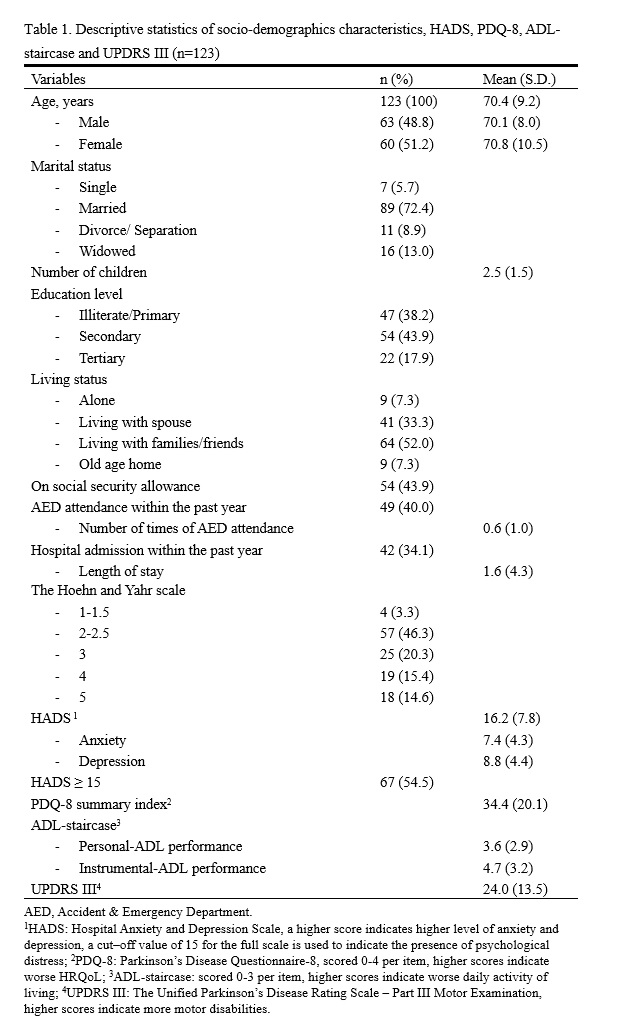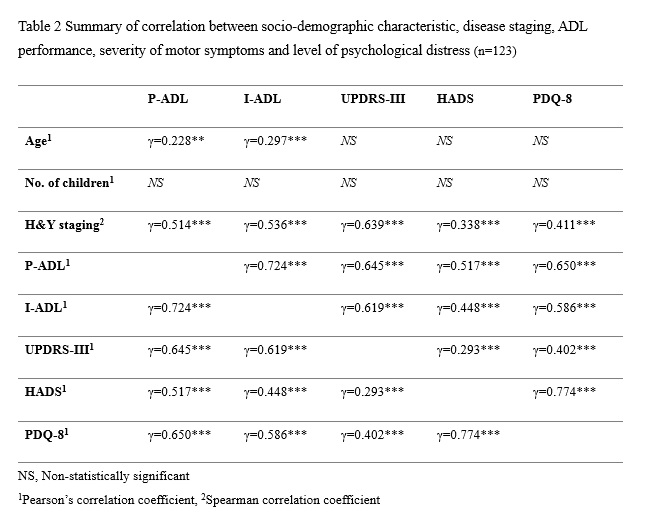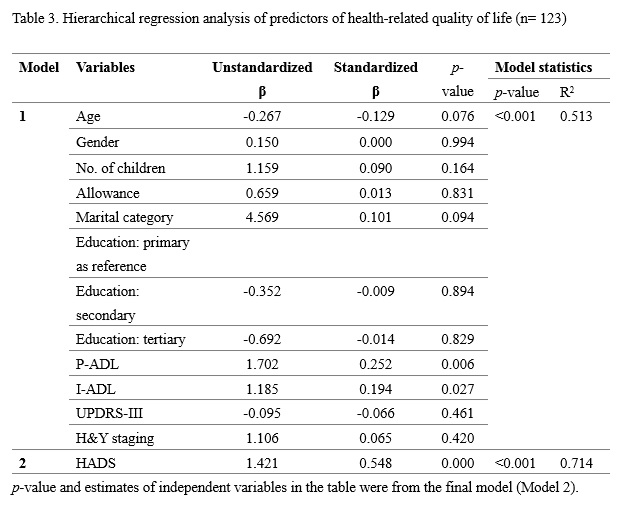Session Information
Date: Monday, June 5, 2017
Session Title: Quality Of Life/Caregiver Burden in Movement Disorders
Session Time: 1:45pm-3:15pm
Location: Exhibit Hall C
Objective: This study aimed to (i) examine the relationship of psychological distress and HRQoL and (ii) explore the illness experience among people with PD.
Background: Neuropsychiatric symptoms like anxiety and depression are the most prevalent non-motor symptoms among PD patients. Since non-motor symptoms have a great effect on HRQoL, few studies have investigated the relationship between psychological distress, HRQoL and illness experience in PD population.
Methods: This is a mixed method study. People with idiopathic PD, aged ≥ 45 years old and communicable were recruited. A set of rating scales were administered, including UPDRS-III, Hospital Anxiety and Depression Scale, PDQ-8, ADL-Staircase and a demographic sheet. Hierarchical linear regression was used to assess the effect of psychological distress on HRQoL. Then, semi-structured interviews were done with purposive sampling of informants with diverse socio-demographic background and survey results. Thematic analysis was used to identify themes about their unmet care needs. Ethics approval was granted (CUHK-CREC 2015.715).
Results: A convenience sample of 123 PD patients completed the questionnaire. Sample characteristics and outcome variables were summarized in Table 1. Psychological distress was prevalent and highly correlated with HRQoL (Table 2). In hierarchical linear regression (Table 3), ADL performance and psychological distress significantly predicted HRQoL. After adjusting for demographic and clinical results, psychological distress further accounted for 20.1% of variance of HRQoL. From the semi-structured interviews (n=14), two major themes emerged from participants’ narratives: ‘confronting changes brought by PD’ and ‘readjusting towards changes’. Informants appeared to go through a complex illness trajectory facing turmoil and demoralization resulting from losing functions and mastery, role change and unaddressed psychosocial needs. Emotion-focus coping strategies like acceptance were identified to help them reaching a state of calmness in facing changes brought by PD.
Conclusions: Both psychological distress and ADL performance are significant and modifiable predictors of poor HRQoL in PD population. Since emotion-focus coping could aid the coping process towards PD, mind-body interventions like yoga, that teach mindfulness along with physical training (1) could maximize the potential benefit on HRQoL of PD patients.
References: 1. Kwok, J.Y.Y., Choi, K.C., & Chan, H.Y.L. (2016). Effects of mind–body exercises on the physiological and psychosocial well-being of individuals with Parkinson’s disease: A systematic review and meta-analysis. Complementary Therapies in Medicine (29), 121-131.
To cite this abstract in AMA style:
JJ.Y.-Y. Kwok, M.M. AuYeung, H.Y.-L. Chan. Understanding the illness experience of people living with Parkinson’s disease: A mixed methods study [abstract]. Mov Disord. 2017; 32 (suppl 2). https://www.mdsabstracts.org/abstract/understanding-the-illness-experience-of-people-living-with-parkinsons-disease-a-mixed-methods-study/. Accessed April 21, 2025.« Back to 2017 International Congress
MDS Abstracts - https://www.mdsabstracts.org/abstract/understanding-the-illness-experience-of-people-living-with-parkinsons-disease-a-mixed-methods-study/



